by Sabyn Javeri Jillani

Eve was thrown out of heaven because she was a temptress, Sita had a trial by fire because she crossed a line, Lot’s wife (who doesn’t even get a mention by her own name) was turned into a pillar of salt because she was disobedient, but Mary was a saint for giving birth as a virgin. Collectively, the one thing that binds these narratives is a sense of shame. But what if these stories about women were told to us from a different perspective? What if we were told that Eve was a pioneer and a risk-taker for indulging her curiosity about the forbidden fruit? Or that Sita was charitable and fearless for wanting to help an old man in need, Lot’s wife was a patriot and a freethinker for looking back at the land that had raised her, and that Mary was a courageous single mother. How would women see themselves if they grew up thinking of themselves as survivors and not as victims blamed for their choices and penalized for their actions or praised for their purity and silence? What if we saw women for who they are instead of who we want them to be? What if didn’t shame women?
Aib, sharam, haya, izzat, laaj, dishonour — almost every language has a word for shame. And the burden of that shame lies on the shoulders of the female. Because when we grow up in a culture which penalizes women for the consequences of their choices, we internalize a culture of shame — a culture of victim blaming that shames women for asserting their sexuality and agency, shaming them for raising their voices and scrutinizing their bodies. Women learn to curb their curiosity, to stifle desire, and to take ‘submissive and compliant’ as compliments.
As I saw the backlash against Pakistan’s Aurat (Women’s) March unfold this year, I was reminded of the politics of shame that so many women all over the world internalize. I found myself questioning… what does it mean to grow up knowing you are being watched? What does it mean to live in a voyeuristic bell jar where the collective weight of society determines the choices you make? When the length of your skirt can be responsible for your rape, when loving someone your family does not approve of can get you killed, when violence against you is tolerated and even justified because it is your fault that you could not understand the code of honor? From body shaming to slut shaming, the shame is all yours.

“Shame on you for being so fat”, “Shame on you for being too thin and not having any curves”, “Shame on you for stepping out of the house looking like this”, “Shame on you for your body hair”, “Shame on you for letting people know you are on your period”, “Shame on you for getting raped”, “ Shame on you for staying out late or being there in the first place”, “Shame on you for being a working mother and not raising your children yourself”, “Shame on you for not working and putting the entire burden of providing on your husband”, “Shame on you for going to engineering school and taking a guy’s place”, “Shame on you for being so educated and not working”, “Shame on you for not being educated enough”, “Shame on you for being so girly and frivolous”, “Shame on you for not being feminine enough”, “Shame on you for being more successful than your partner” “Shame on you for not being successful enough”.
 As a woman, these were phrases I grew up hearing all around me. I never questioned them, didn’t think twice that the men around me would be applauded for the very qualities that I was shamed for. Ambition is a woman’s selfishness, sexuality and desire a sin, body language meant taking up as little space as possible, and bodily functions such as mensuration were meant to be hidden. So internalized were these notions that I grew up learning to lower my voice and shrink my body, to subordinate myself to make my partner feel bigger. That these embodiments of shame could be challenged didn’t even cross my mind. Women of my generation did not have the vocabulary to express what we were feeling because someone else was telling our story for us. I didn’t even know I was the central character of my story, so used to was I of being sidelined. Luckily, things are changing and events such as Aurat March are trying to raise awareness of the unconscious bias and internalized patriarchy that so many of us, who grew up in a world before social media and globalization, had taken for granted.
As a woman, these were phrases I grew up hearing all around me. I never questioned them, didn’t think twice that the men around me would be applauded for the very qualities that I was shamed for. Ambition is a woman’s selfishness, sexuality and desire a sin, body language meant taking up as little space as possible, and bodily functions such as mensuration were meant to be hidden. So internalized were these notions that I grew up learning to lower my voice and shrink my body, to subordinate myself to make my partner feel bigger. That these embodiments of shame could be challenged didn’t even cross my mind. Women of my generation did not have the vocabulary to express what we were feeling because someone else was telling our story for us. I didn’t even know I was the central character of my story, so used to was I of being sidelined. Luckily, things are changing and events such as Aurat March are trying to raise awareness of the unconscious bias and internalized patriarchy that so many of us, who grew up in a world before social media and globalization, had taken for granted.
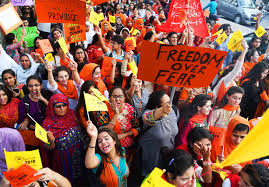
Pakistan’s Aurat March aims to raise awareness of internalized misogyny along with calling out the patriarchy. Initiated in March 2018, it’s an organized protest held on Women’s Day where Pakistani women from all walks of life come out on the streets to march together for the rights of the marginalized. This year, it was called Aurat ‘Azadi’ March — or Women’s ‘Freedom’ March. The fact that they have to insert the word freedom into a women’s march emphasizes how confined and oppressed the women feel due to the lack of political and public representation. But this is not rage, or a mere show of emotion. Nor is this self-pity. These women are not asking for power. They are reminding the public that they too are powerful, but that they are made to feel ashamed of their strength in a culture that treats ‘ambition’ in women as a flaw while glorifying men who lead. The methodical approach the organizers of the March use shows the level of leadership and organization involved. Each chapter of the Aurat March in Pakistan’s metropolitan cities create manifestos focusing on issues of health care, minority rights and even climate change. Issues which are not just ‘women’s problems’ as they are deemed, but the whole nation’s. These are basic human rights which women should not have to demand in the first place. These are issues which affect the society as a whole yet it falls on Pakistani women to make the country realize it. And for this they are shamed.
Like the previous years, this year, too, the Women’s March attracted its share of detractors as it gained momentum with more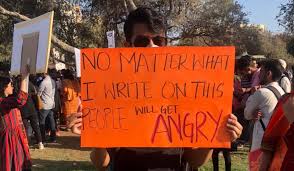 and more women joining in the cause. It was interesting to watch that despite the fact that the women marchers had clear manifestos — Lahore demanded access to health care, Karachi called for safety in public spaces, and Islamabad asked for clean air and climate protection- – amidst other demands for gender equality and respect, the media only focused on scandalizing them.
and more women joining in the cause. It was interesting to watch that despite the fact that the women marchers had clear manifestos — Lahore demanded access to health care, Karachi called for safety in public spaces, and Islamabad asked for clean air and climate protection- – amidst other demands for gender equality and respect, the media only focused on scandalizing them.
The protestors were ‘shamed’, harassed and threatened. The women were trolled online, their words taken out of context, their banners misinterpreted.
This was nothing new as in previous years they were accused by clergyman Tariq Jameel of bringing the pandemic upon the nation And the year before they were accused of destroying Pakistan’s cultural values. The more they marched, the more annoyed the patriarchs got, with some even using state-level legislature to ban the march.
However, this year, one particularly concerning threat was the accusation of blasphemy. This showed how fearful the patriarchs were becoming as this is a card that has been reserved only for those the state and the clergy desperately wanted to silence. On one such placard, a protestor had penned the age of a young child molested by an older man, and pointed out that while the survivor was silenced, the man was allowed to speak publicly, even lead the call to prayer. However, this particular slogan infuriated some patriarchs who somehow connected it to the fact that the Holy Prophet at the age of fifty had been given the hand of his companion Hazrat Abu Baker’s daughter in marriage when she was nine. It completely derailed the real issue in hand, becoming a religious debate instead of the social evil that child abuse is. The fact that a young girl was trying to vocalize her trauma and create awareness of child abuse was sidelined. Instead, she was made the focus, shamed, threatened and made to apologize.
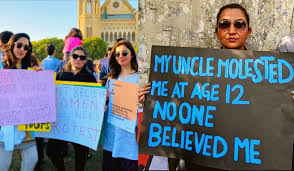
But then, we have a history where every time a woman raises her voice, her words are twisted, her choices questioned. Eve and Sita are prime examples. And this was no exception. The original idea was squelched and the focus shifted. The real issue here remains child sexual abuse, something that is rampant in Pakistan. Yet again, it is the survivors (and murder victims in the case of young Zainab) who are silenced and made to feel ashamed for making others uncomfortable about the abuse that they want to ignore.
Isn’t it about time that we started rethinking who should be ashamed here? Why do we shame the survivor for being raped? Why don’t we shame the perpetuator?
Even the way rape is reported in our media puts the onus on the survivor: ’Young girl raped in Karachi’. Why does the headline not say, ‘Middle aged man named XYZ brutally raped a girl in Karachi’. Why do we not check our unconscious bias when we are reporting? Why don’t we stop to think whose story we are telling when we leave out the perpetrator’s identity? The focus is on shaming the survivor because of the unconscious bias that somehow it was her own fault that she got raped.
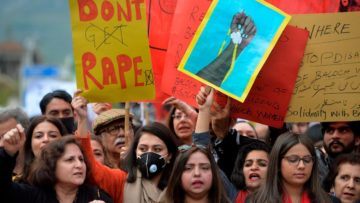
It is because of this stigma of shame that much of sexual violence is not even reported. The humiliation of speaking out against sexual violence makes it taboo because in a society where a woman’s worth is her marriageability, any association of having been abused would lower her value. How perverse is that? Boys, too, get raped and abused but are silenced because of the shame attached to sodomy. Isn’t it time we shamed those who commit such heinous crimes instead of those who suffer?
In her recent book Sex and Lies: True Stories of Women’s Intimate Lives in the Arab World, French Moroccan writer Leila Slimani points out that such hypocrisy creates “an institutionalized culture of lying.” By tolerating sexual violence, we normalize it in the society. When we shame people for speaking the truth, we don’t make things better. We make them worse. We create a culture of hypocrisy.
Aurat March is an attempt to call out that hypocrisy. It endeavors to tell the other side of the story. But changing the narrative is not always easy, and patriarchy tries to trivialize the efforts of those who strife for change. An example of this societal hypocrisy can be seen in the way the focus of the media is once again on women demanding liberation from social norms by shaming them for it, instead of acknowledging the deeper issues they were raising alongside. Placards such as ‘Apna Khana Khud Gram Karo’ (Heat up your food yourself) become a huge point of debate but the ones calling out for help against sexual violence remain undiscussed.
But that doesn’t mean they are not part of the protest. This year, a disturbing yet powerful sight was a visual art installation titled ‘Dirty Laundry’. Umaima Ahmed reported in Global Voices that, “The Aurat March Lahore set up an art installation depicting the “patriarchal stains” on women’s clothes… mentioning the age at which they first encountered violence, harassment, emotional abuse”. The visual of the women’s shirts – a metaphorical resistance against the sexual abuse of women, and particularly that of children was a powerful and emphatatic way to raise awareness.
But the critics of the march had little empathy for them. They were focused on shaming women marching in the streets. They called it offensive to Pakistani culture, where a woman’s place was supposed to be at home. But culture is fluid. Unlike patriarchy, which is rigid. Once again, religion and culture were intertwined to suppress the voices of the subaltern. Once again shame was used as a weapon.
But abuse of power is nothing new, and the abuse by men in power, whether they be holy men or politicians, isn’t unusual either. To quote Slimani again, “We need to stop pitting Islam and universal Enlightenment values against each other.” She goes on to write, “Stop opposing Islam and equality of the sexes.”
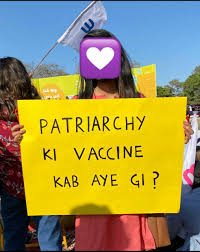
But then how would the pandemic of shame spread? As one of the banners at the march read, “The real pandemic is patriarchy”.
The new generation of Pakistani women is trying to ‘unlearn’ the shame that many women of my generation grew up internalizing. Of course, there are great pioneers like human rights activist and lawyer Asma Jahangir and trailblazing journalist and editor Razia Bhatti who challenged the norms. But this time the resistance is coming from the grassroots. It’s organic. And the shame mongers are not too happy about it.
It isn’t easy to speak up. Especially when you grow up in a culture of silence. Nor is it easy to break out of a culture that shames you for choices. But at the end of the day, women have to know that only they can speak for themselves because as Toni Morrison wrote, ‘There are no facts, only truths.’
There is no honour in honour killings, there is no shame in calling out hypocrisy, there is no guilt in raising your voice, there is no disrespect in fighting for equality. The power lies in being able to tell your story.
